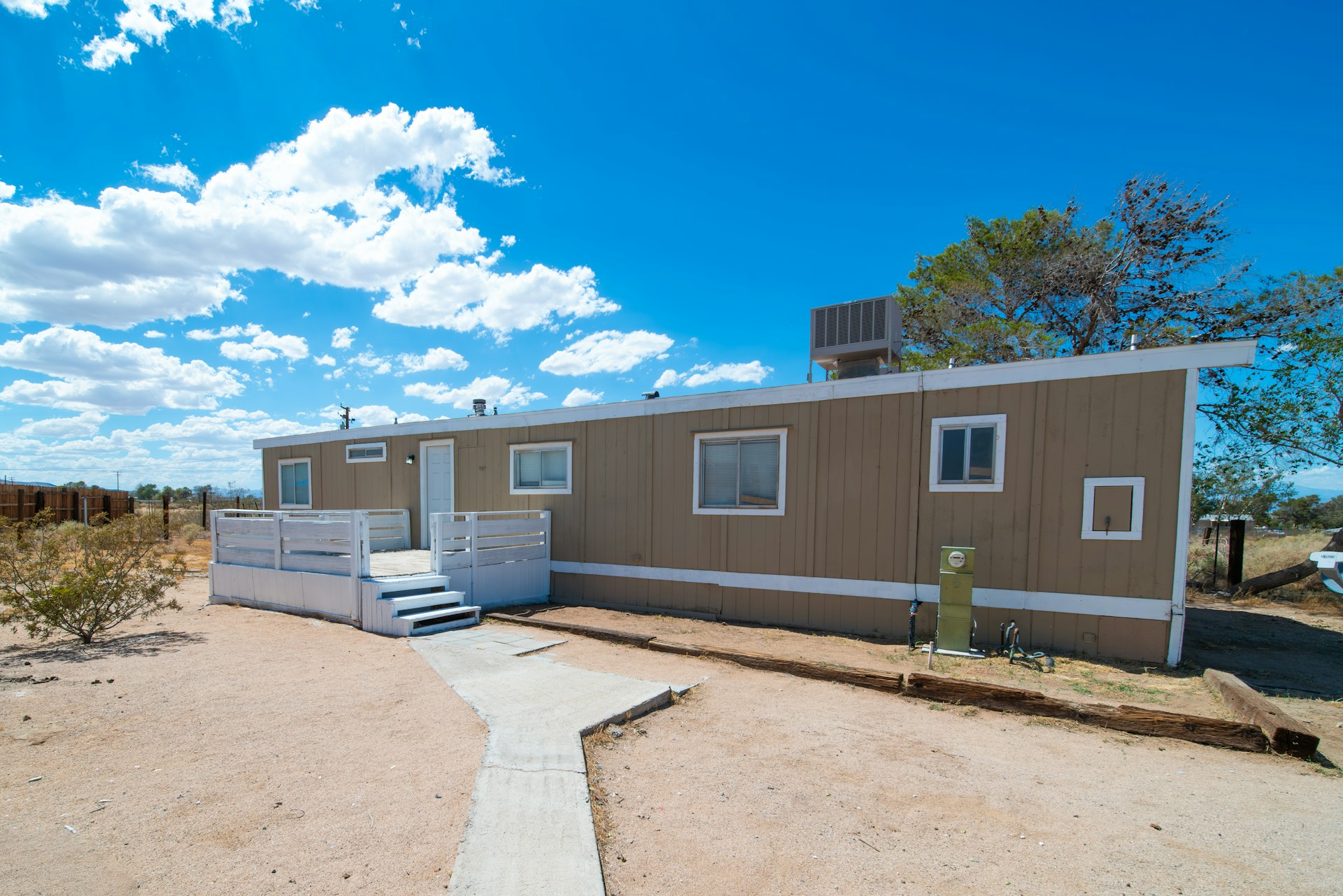A VA loan makes homeownership more accessible for many veterans, but the financial product has several property requirements. These requirements are more challenging than the ones for conventional mortgages and make most fixer-uppers out of the question for VA loan borrowers. This guide will explore how VA loans work and if it is possible to buy a manufactured home with one of these loans.
VA Loan for Manufactured Home: Overview
Here’s the overview for using a VA loan to buy real estate and what you should look for before getting started.
What is a VA Loan?
A VA loan is a financial product that’s backed by the Department of Veteran Affairs. These home loans offer some of the most competitive annual percentage rates (APRs) in the industry and do not require any money down. You will have to pay a VA funding fee to support the program if you take out one of these loans, but you won’t have to worry about private mortgage insurance.
While these loans are some of the top options available, they’re not for everyone. You must be an eligible service member, veteran, or spouse to have this loan available to you. Eligibility is based on how long the service member or veteran served. You will have to present a Certificate of Eligibility (COE) to a VA lender before they give you financing.
What is a Manufactured Home?
A manufactured home is a home that was built in a facility and transported to its current address. These prefabricated homes have been around for decades and continue to attract plenty of buyers due to their affordability and spaciousness.
These affordable housing properties are designed more efficiently, which makes them less expensive to build. Instead of hauling the equipment, labor, and materials to the construction site, it’s all handled in one central location at scale. That’s why these properties tend to be cheaper than homes built on-site.
Can You Get a VA Loan for a Manufactured Home?
You can use a VA home loan to buy a manufactured home as long as it meets the VA’s property requirements. These requirements aren’t just for manufactured homes. They extend to any primary residence that you are considering.
The Federal Savings Bank can provide valuable insights and assistance for those contemplating a manufactured home purchase using a VA loan. Many service members and veterans may not realize that VA loans are indeed applicable for manufactured homes, which can be an excellent option for affordable housing.
Their team will guide you through the specific requirements for securing a VA loan on a manufactured home, including eligibility criteria and necessary documentation. With their expertise, you can confidently explore this avenue as a viable option for homeownership. If you’re interested in learning more about utilizing a VA loan for a manufactured home, don’t hesitate to contact The Federal Savings Bank.
What is a VA Loan for a Manufactured Home?
A VA loan is a mortgage with a 15-30-year term. These loans have competitive rates, no down payment requirement, and generous FICO score minimums. VA loans only allow you to purchase a primary residence, so you cannot use this financial product to build a rental property portfolio.
Who is Eligible for a VA Loan for a Manufactured Home?
Service members, veterans, and their spouses are eligible for VA loans as long as the service member or veteran fulfills a minimum service requirement. The Department of Veteran Affairs website lists the service eligibility requirements for its loans.
Property Requirements
The Department of Veteran Affairs lays out several requirements for any property. If a manufactured home fulfills these conditions, it is eligible for a VA loan:
- At least 400 square feet for a single-wide house or 700 square feet for a double-wide house
- Move-in ready with quality sanitation, heating, energy, and structural integrity (if repairs are deemed necessary, they will be required right away)
- A HUD tag
- A permanent foundation
Foundation Requirements
The VA program requires that a property is structurally sound. Any issues with the foundation can create issues with approval, even if you fulfill the other requirements. Homeowners may be able to get financing if they make a higher down payment and pay a higher APR.
Site and Location Requirements
The Department of Veteran Affairs has different requirements for each state. For instance, you must collect information about a property relating to wood-destroying insects if the property is in Texas, Oklahoma, Arkansas, or Louisiana.
Pros of Using a VA Loan for a Manufactured Home
These are some of the VA loan benefits that make this financial product attractive:
- No down payment required
- No private mortgage insurance
- Competitive interest rates
- Generous credit score requirements
Cons to Consider
While a VA loan offers several perks, these are the disadvantages to keep in mind before committing to this financial product:
- Longer application process
- The property must fulfill the VA’s requirements
- VA funding fee
Is It Harder to Get a Loan for a Manufactured Home?
The VA does not have any age restriction on manufactured homes. A property can be a few weeks or several decades old and still be eligible for a loan. It isn’t harder to get a loan for a manufactured home compared to a non-manufactured home.
VA Loan Manufactured Home: The Application Process
Ready to embark on the journey to owning a manufactured home? Here’s how the VA loan application process works.
Pre-Qualification Steps
VA-approved lenders will ask for several details during the pre-qualification process. They will want to know how much you want to borrow, your gross monthly income, employment history, monthly liabilities, assets, and other details. Financial institutions will also run hard credit checks during this process.
Finding a Lender
You’ll have to compare several lenders to gauge which mortgage loan is the right choice for your financial situation. Borrowers will have a smaller pool of lenders since not every bank, credit union, or online lender offers VA loans. However, you can find competitive options and compare their rates and terms.
Required Documentation
Lenders will ask for several documents to verify your identity and income. These are some of the resources you will need:
- Certificate of Eligibility
- Personal ID
- Social Security number
- Proof of income
- Employment history
You will also have to provide all of these documents for any type of loan for a manufactured home or a mobile home unit, except a COE.
Step-by-Step Application Guide
Applying for a VA loan is straightforward. After comparing lenders and deciding the top choices, you can submit applications on each of the lenders’ websites. You’ll have to provide important documents during the application process.
Lenders will let you know if you are approved and make offers. Once you compare rates and terms from multiple lenders, you can accept one of the offers and close on the loan.
What are the Fees and Costs Involved?
VA loans have several costs to keep in mind before taking out a loan. Here’s what you should know.
Loan Limits and Terms for Manufactured Homes
The VA loan limit varies for each location, but the standard VA loan limit is currently $766,550. If you want to buy a house that’s worth more than that, you will have to provide a sufficient down payment so the loan’s balance falls below this limit. Areas with higher costs of living have higher VA loan limits. This limit increases each year due to inflation.
Down Payment and Interest Rates
Interest rates are present for any loan, but you’ll also have to make a down payment to minimize overall costs. VA loans are one of the few financial products that do not require a down payment and come with no private mortgage insurance. However, a down payment can help you save on other fees and reduce how much interest you pay over the loan’s duration.
Closing Costs and Fees
Closing costs add up for any loan, including VA loans. These costs include appraisal fees, origination fees, and other costs incurred throughout the process.
Additional Expenses to Consider
VA loan borrowers also have to pay a VA funding fee. This fee keeps the VA program going while minimizing the impact on taxpayers. This fee ranges from 1.25% to 3.3% of the loan’s balance and depends on how much money you put down. A higher down payment will reduce your VA funding fee. It’s best to make at least a 5% down payment or higher to save on the VA funding fee. You’ll get the most saves if you put 10% or more down.
Other Important Considerations for VA Loan for Manufactured Homes
These are some of the other details to consider before getting a VA loan for a manufactured home.
Importance of the VA Appraisal
A VA appraisal ensures that the property fulfills the VA’s requirements. The property must be safe and sanitary and fulfill other benchmarks. This appraisal also helps the buyer and lender assess the property’s value.
Required Property Inspections and Insurance
The VA does not require a home inspection, and you won’t have to pay private mortgage insurance on the property. However, the appraisal is similar to an inspection since an appraiser must ensure the property fulfills the VA’s requirements.
VA Loan Approval and What to Expect at Closing
While the Department of Veterans Affairs does not issue credit score requirements, VA lenders are the ones creating the loans. Many VA lenders have credit and DTI ratio requirements for their borrowers. Once you get approved, you’ll have to close on the loan. You’ll have to sign several documents and pay closing costs at the end of the process. Then, the deed of the house will be updated to your name.
FAQs for VA Loan Manufactured Home
Yes. The VA requires a foundation inspection on manufactured homes and other properties.
Yes. The VA requires tie-downs for manufactured homes.







